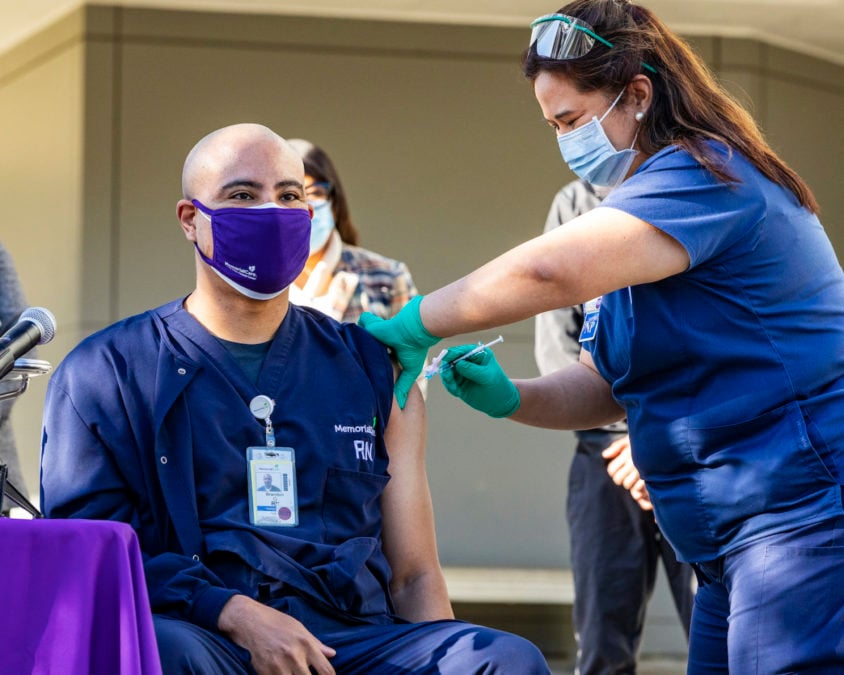
A COVID-19 vaccine is administered to patient in the parking lot of Long Beach Memorial Medical Center on Dec. 18. Photo: City of Long Beach.
As several studies have reported that health disparities and underlying health conditions make the LGBTQ community especially vulnerable to COVID-19, a statewide bilingual campaign promoting the COVID-19 vaccine, testing, and safety guidance to queer Californians was launched this week.
The public education and outreach campaign is part of the Equality California Institute, the education arm of Equality California, and its ongoing efforts to help LGBTQ Californians find resources and support related to the COVID-19 crisis. In May, an online help center was launched. A Spanish version of that site will be launched in the coming weeks.
“California has one of the largest Latinx populations and the largest LGBTQ population in the nation,” said Beatriz Valenzuela, a spokeswoman with Equality California. “About 34 percent of LGBTQ people in California are Latinx, and many of them speak Spanish.
“To make sure that every facet of our marginalized communities is being included in the COVID-19 conversation, it’s important to reach out to them where they live,” she said. “Making sure everyone has accurate information about the vaccine is critical in combating this devastating virus.”
The COVID-19 outreach and education program will include several components:
- A direct-text campaign planning to reach 150,000 LGBTQ Californians about the help center
- A bilingual digital media campaign including educational emails and social media posts across different platforms
- Virtual town hall meetings focused on COVID-19 and the LGBTQ community with an opportunity for people to ask questions
- Direct mailing of educational materials
LGBTQ community vulnerable to COVID-19
A recent poll study from the Williams Institute found that LGBTQ people of color are twice as likely to test positive for COVID-19 than their non-LGBTQ white peers, 15% compared to 7%.
The study also said that most government data collection efforts focused on COVID-19 do not include sexual orientation and gender identity measures. These omissions, as well as other state and federal efforts to track deaths and disease more generally, hinder efforts to incorporate the needs of LGBT populations into COVID-19 recovery efforts, the study said.
Another study, this one from the Centers for Disease Control and Prevention, confirms that LGBTQ people face underlying health disparities and health conditions that make the community particularly vulnerable to COVID-19.
For example, LGBTQ people face higher rates of comorbidities such as HIV and cancer, are more likely to use tobacco products, are less likely to have health insurance and less likely to access care when they are sick because they fear discrimination.
Members of the LGBTQ community are also overrepresented in the industries hit hardest by economic fallout, such as the food services and hospitality industries, and the gig economy.
“This vulnerability might be magnified when coupled with other demographic characteristics such as race-ethnicity,” the CDC said.
LGBTQ data missing
However, the lack of data on sexual orientation and gender identity make it impossible to know the effect COVID-19 has had on the LGBTQ community, the CDC said.
The nation’s federal health agency recommended that data collection must be a priority.
“This data gap underscores the need to extend COVID-19 surveillance and other studies to include measures of sexual orientation and gender identity,” the CDC report said.
California drops the ball
California could have been a leader on this topic, but a year into the pandemic, despite regulatory and legislative efforts to track COVID testing and infections among LGBTQ Californians, the information has not been published or is available from state health officials, the Bay Area Reporter said.
On the county and city levels, problems also persist in gathering accurate sexual orientation and gender identity COVID data, according to the article.
In Long Beach, Mayor Robert Garcia, who identifies as gay, didn’t advocate for the LGBTQ community and ask the city’s health department to collect the vital data. The city only started collecting it after constant questioning from Q Voice News.
